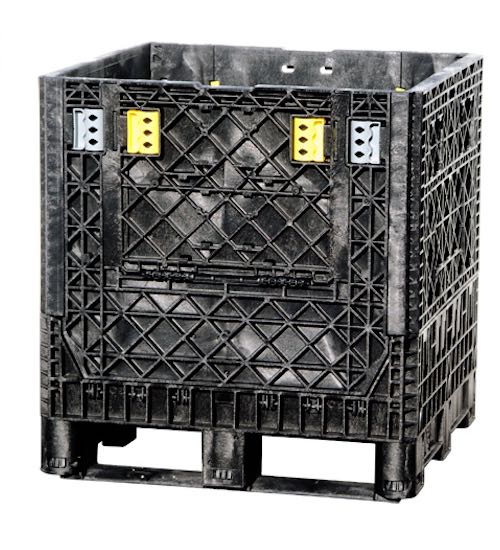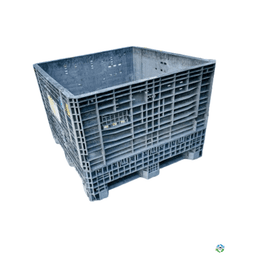Learn why refurbished bulk containers are trusted by logistics and storage experts
Wiki Article
The Ultimate Guide to Picking the Right Mass Containers for Your Organization Demands
Choosing the suitable mass containers is important for any type of service that counts on efficient logistics. Numerous kinds of containers exist, each created for certain products and applications. Elements such as dimension, product compatibility, and governing requirements play a significant role in this decision-making process. Understanding these components can bring about enhanced functional efficiency. However, lots of organizations forget essential aspects that could enhance their total effectiveness and sustainability. What are these considerations?Comprehending Various Kinds Of Mass Containers
Bulk containers serve as crucial devices for companies seeking effective storage space and transportation remedies. These containers come in various types, each developed to satisfy details functional demands. One common type is the intermediate bulk container (IBC), which is optimal for granulated and fluid products, offering a balance of capability and maneuverability. One more popular alternative is the mass bag, or FIBC, ideal for dry, flowable products. These adaptable containers are light-weight and can be easily transferred and kept. For much heavier materials, rigid bulk containers are often used, supplying resilience and stability for secure handling. Furthermore, there are specialized containers customized for harmful materials, making sure conformity with safety and security guidelines. Understanding the unique features of these bulk container types allows services to make informed choices that enhance logistics and reduce prices. By picking the appropriate container, business can enhance their operational efficiency and simplify their supply chain processes.Trick Product Factors To Consider for Bulk Containers
When selecting mass containers, it is necessary to consider the materials made use of in their building and construction. Elements such as chemical, resilience, and toughness compatibility play a critical function in guaranteeing the containers fulfill particular functional demands. Furthermore, weight and portability worries can impact both effectiveness and transportation logistics.Material Durability and Stamina
Resilience and toughness are crucial factors in choosing materials for mass containers, as they directly affect the container's capability to stand up to numerous environmental conditions and taking care of processes. Materials such as high-density polyethylene (HDPE), polypropylene, and stainless steel are generally favored for their robust residential or commercial properties, using resistance to abrasion, temperature level, and effect variations. The selection of product also affects the overall life expectancy of the container; stronger materials commonly cause much less frequent substitutes, bring about set you back financial savings with time. Additionally, the weight of the product can influence delivery prices and convenience of handling. Organizations must consider their specific operational environments and the potential for damage to assure peak resilience and strength in their mass container option.Chemical Compatibility Aspects
Comprehending chemical compatibility is necessary for choosing mass containers, as the products utilized need to stand up to the certain materials they will hold. Different aspects affect compatibility, including the chemical nature of the components, temperature, and period of storage. Destructive chemicals may require containers made from stainless steel or specialized plastics that stand up to deterioration. Additionally, responsive materials can generate heat or gases, necessitating aired vent or pressure-rated containers. The choice of container product, whether polyethylene, metal, or polycarbonate, should straighten with the chemical buildings of the kept substances to stop breaches or leakages. Ultimately, an extensive analysis of these compatibility factors assures risk-free handling and storage space, securing both personnel and the atmosphere while preserving product honesty.Weight and Mobility Concerns
Picking bulk containers entails not only evaluating chemical compatibility however also taking into consideration weight and mobility. Businesses have to evaluate the convenience of handling and transport to maximize effectiveness. Lightweight materials like high-density polyethylene (HDPE) or light weight aluminum can facilitate much easier movement and minimize delivery costs. On the other hand, larger containers might provide boosted toughness but can impede flexibility, particularly in atmospheres calling for frequent moving. Additionally, the design of the container ought to permit convenient lifting and piling, guaranteeing ergonomic safety and security for workers. Firms need to additionally consider the infrastructure available for transport; as an example, containers compatible with forklifts or pallet jacks can streamline operations. Inevitably, the right equilibrium in between weight and transportability straight affects functional effectiveness and cost efficiency.Sizing Your Bulk Containers for Ideal Effectiveness
When sizing bulk containers, businesses should meticulously assess the dimensions needed to fit their certain products. Additionally, weight capability is a critical factor that influences efficiency and security during transport and storage. Effective sizing not only maximizes area however also optimizes functional operations.Establishing Container Capacities
Choosing the ideal measurements for mass containers is vital for taking full advantage of efficiency in storage space and transportation. Businesses have to evaluate their specific requirements, considering variables such as offered space, the nature of the items being stored, and the methods of transportation used. Accurate measurements guarantee that containers fit ideally in stockrooms and lorries, decreasing lost space and reducing taking care of time. Criterion sizes can offer convenience, yet custom-made dimensions could be needed for distinct needs or to fit particular items. Furthermore, it is important to review piling capacities and accessibility, as these variables affect overall functional efficiency. Ultimately, the ideal measurements result in boosted organization and structured logistics, benefiting the general productivity of business.Weight Capacity Considerations
Recognizing weight capability is essential for services intending to enhance their refurbished bulk containers mass container efficiency. The weight ability of a container directly influences storage abilities, transportation logistics, and overall operational expenses. Picking containers with the proper weight restrictions guarantees that companies can securely save and transfer their products without risking damage or conformity issues. Overloading containers can cause architectural failings, while underutilizing ability lead to lost resources. It is essential for businesses to evaluate their product weights and think about any kind of governing needs when selecting containers. Additionally, variables such as the type of product, planned usage, and ecological problems need to also affect weight capability decisions. By evaluating these components, services can improve effectiveness and ensure a streamlined supply chain.Regulative Conformity and Security Criteria

Regulative compliance and safety and security requirements play a necessary function in the selection of mass containers for services. Organizations needs to assure that their containers meet numerous policies established by regional, national, and global authorities. These criteria usually concern material safety and security, structural integrity, and appropriate labeling, which help prevent accidents and ensure the risk-free transportation of items.
Furthermore, adherence to industry-specific standards, such as those from the Fda (FDA) or the Occupational Security and Health Management (OSHA), is vital for business taking care of unsafe products or food items. Non-compliance can cause penalties, lawful issues, or damages to a company's credibility.
Organizations ought to also consider the container's compatibility with the materials being stored or transferred to avoid contamination or chain reaction (used bulk containers). To summarize, comprehending and implementing governing conformity and safety and security requirements is essential for the reliable and accountable usage of mass containers
Sustainability Choices for Eco-Friendly Mass Containers

Firms are additionally discovering choices made from recycled products, which not only save resources yet additionally support the reusing industry. Innovations in style permit for lighter containers that require much less power to transport, additionally improving sustainability. By incorporating these green bulk container options, companies can show their dedication to environmental stewardship while meeting consumer demand for lasting methods. This shift not only helps the earth but can also boost brand name reputation and customer loyalty.
Cost-Effectiveness and Budgeting for Bulk Containers
While many services concentrate on sustainability, cost-effectiveness continues to be an essential element when choosing mass containers. Organizations has to assess the first acquisition price, along with long-lasting operational prices, to assure financial feasibility. Aspects such as reusability, upkeep, and sturdiness play a substantial function in figuring out overall expenses.Buying top notch containers may produce higher ahead of time costs but can lead to savings with minimized substitute rates and decreased waste. In addition, businesses need to take into consideration transport prices and storage space performance, as these can influence the overall budget plan.

Frequently Asked Questions
How Do I Establish the Right Container for Hazardous Products?
To establish the ideal container for harmful products, one have to examine compatibility with the compound, take into consideration the container's product, look for governing conformity, and analyze capacity and security functions to ensure correct handling and storage.Can Bulk Containers Be Custom-made for Specific Products?
Yes, bulk containers can be customized for certain products. used bulk containers. Various attributes, such as design, product, and size, can be tailored to meet unique needs, making certain optimal safety and efficiency for delivering and keeping different goodsWhat Is the Typical Lifespan of Different Bulk Container Kind?
The typical lifespan of bulk container types differs; plastic containers last 5-10 years, steel containers 10-20 years, and wood containers generally last 3-7 years, depending upon usage, upkeep, and environmental problems.How Should I Tidy and Maintain Bulk Containers?
To clean up and keep bulk containers, one must routinely evaluate for damage, eliminate residue, laundry with proper detergents, wash extensively, and warranty proper drying out prior to storage space. Complying with manufacturer guidelines enhances longevity and safety and security during use.Exist Rental Choices for Bulk Containers Available?
Yes, numerous companies use rental alternatives for bulk containers, supplying versatility for businesses. These leasings can accommodate various requirements, permitting companies to manage stock efficiently without the commitment of purchasing containers outright.Sturdiness and toughness are important aspects in selecting products for bulk containers, as they straight affect the container's capacity to stand up to various ecological conditions and taking care of procedures. Understanding chemical compatibility is necessary for choosing mass containers, as the materials used have to resist the particular compounds they will certainly hold. Recognizing weight capacity is essential for services intending to enhance their bulk container performance. Regulative conformity and safety requirements play an important duty in the selection of bulk containers for services. While numerous businesses concentrate on sustainability, cost-effectiveness stays an essential element when picking mass containers.
Report this wiki page